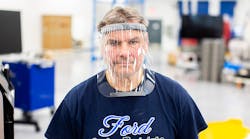Ford announced on May 16 that it had signed contracts with health systems in four metro areas with major company facilities to quickly test hourly and salaried employees with suspected symptoms of COVID-19.
“Fast and accurate testing is a key tool in the effort to help stop the spread of COVID-19,” said Dr. Walter Talamonti, Ford Medical Director. “These contracts will allow us to test employees with suspected symptoms and have results back within 24 hours. If they test positive, we can quickly identify close contact employees who may have been exposed and ask them to self-quarantine for 14 days.”
In Southeast Michigan, Ford will work with Beaumont Health for testing. In Louisville, Ford employees will be tested through University of Louisville Health. In the Kansas City area, employees will be tested through Liberty Hospital. In the Chicago area, employees will be tested through the University of Chicago Medical Center and UChicago Medicine-Ingalls Memorial Hospital.
In Southeast Michigan, where Ford employs approximately 46,000 people, employees who exhibit symptoms associated with COVID-19 will receive a prescription for testing from Ford’s onsite doctors. This prescription allows employees to receive testing through Beaumont Health.
In Louisville, where Ford has two major assembly plants and employs approximately 12,500 people, employees who exhibit symptoms of COVID-19 will be asked to immediately schedule a telemedicine appointment with a doctor. The doctor can then write a prescription for COVID-19 testing if necessary. Testing will be done through University of Louisville Health.
In the Kansas City area, where Ford builds the best-selling F-150 and employs more than 7,000 people, employees who exhibit symptoms associated with COVID-19 will receive a prescription from Ford’s onsite doctors for testing. They can then access a drive-through testing site at Liberty Hospital.
In the Chicago area, home of Chicago Assembly and Chicago Stamping plants, which together employ nearly 7,000 people, Ford will advise employees who suspect or exhibit symptoms of COVID-19 to call the COVID number of the University of Chicago Medical Center and UChicago Medicine-Ingalls Memorial Hospital. After a phone screening, they will be given a same-day appointment for COVID-19 testing when appropriate.
In all locations, the goal is to have results available within 24 hours.
Testing results will be simultaneously shared with Ford doctors in order to quickly identify others who were in close contact with infected employees and immediately have them self-quarantine for 14 days.
“We are working on quickly expanding testing of symptomatic employees,” said Ken Washington, Ford’s Chief Technology Officer. “The health and safety of our employees has been – and remains – our top priority as we navigate the COVID-19 pandemic. In addition to expanding locations for these tests, we are also pursuing the possibility of voluntary antibody testing in the future for our employees.”
Ford is initially focusing on polymerase chain reaction (PCR) testing, which identifies if someone is actively infected. PCR tests are used to detect the presence of viral RNA, not the presence of the antibodies, which are the body’s immune response.
“Fast, accurate tests work hand-in-hand with personal protection equipment and protocols to create a safe environment for our workforce,” said Gary Johnson, Ford’s Chief Manufacturing and Labor Affairs Officer. “We are proud to partner with the UAW to lead the way on restarting our factories the right way.”
Testing is the most recent addition to Ford’s health and safety protocols in place in the company’s facilities.
To guide the workforce with the new health and safety protocols, Ford has compiled a comprehensive Manufacturing Return to Work Playbook to help protect its workforce, assembled using best practices and input from experts around the world.
Some of the safety protocols include:
- Daily online employee and visitor health self-certifications completed before work every day. Employees or visitors who indicate they may have symptoms or may have been exposed to the virus will be told not to come to Ford facilities.
- No-touch temperature scans upon arrival – anyone with a raised temperature will not be permitted to enter and will need to be cleared of symptoms before returning to work.
- Required face masks for everyone entering a Ford facility. Every Ford team member will be provided a care kit including face masks and other items to help keep them healthy and comfortable at work.
- Safety glasses with side shields or face shields will be required when jobs don’t allow for social distancing.
- There will be more time between production shifts to limit interaction between employees and allow for additional cleaning.
